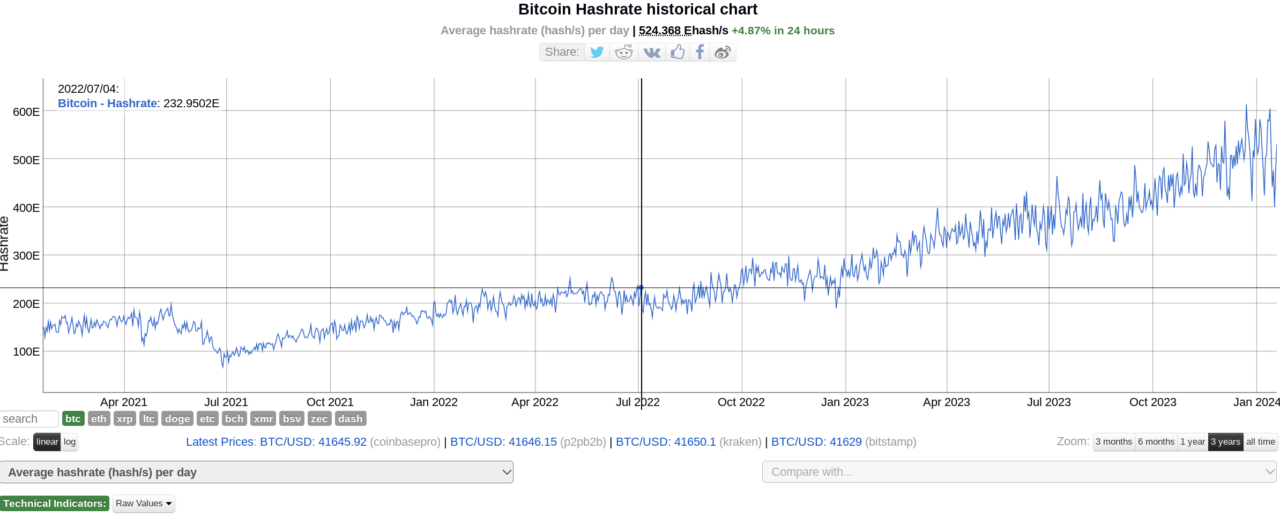In the crypto space, the term “hash rate” refers to the total computational power being used to process transactions and secure the blockchain. It is a measure of the performance of the miners (computers or nodes) participating in the Bitcoin network. Specifically, the hash rate quantifies the number of times the network can attempt to complete a very complex mathematical problem per second. This rate is typically measured in hashes per second (h/s).
Hashing is a fundamental process in Bitcoin’s blockchain management. It involves taking input data (like a Bitcoin block) and running it through a cryptographic hash function, which produces a fixed-size string of characters. This string is the block’s unique fingerprint. For a block to be added to the blockchain, miners must find a hash that meets certain criteria set by the network’s difficulty level. This process is known as “proof of work.”
Here is why this metric is significant:
- Network Security: The higher the hash rate, the more secure the network. A high hash rate means more computational power is required to alter the blockchain, making it increasingly difficult for a single entity or group to execute a 51% attack (where one party controls more than half of the mining power and can manipulate the network).
- Indicator of Network Health: A rising hash rate suggests a healthy and growing network with increasing miner participation. This can be seen as a sign of confidence in the Bitcoin ecosystem.
- Mining Difficulty Adjustments: Bitcoin’s protocol adjusts the difficulty of mining new blocks based on the total hash rate. If the hash rate goes up, the difficulty increases, ensuring that the time to find a new block remains consistent, roughly every 10 minutes. This mechanism maintains the stability and predictability of Bitcoin’s supply.
- Investor Confidence: For investors, a high hash rate can be an indicator of a robust and reliable network. It suggests a strong commitment from miners, who invest significant resources in mining hardware and electricity.
The hash rate can fluctuate due to various factors, such as changes in mining difficulty, the price of Bitcoin, and the cost of electricity. Significant drops in hash rate can indicate problems like miners exiting the network, possibly due to unprofitability or regulatory challenges. Conversely, a consistently high or rising hash rate demonstrates network strength and miner commitment.
Recently, the Bitcoin network achieved a remarkable milestone, reaching an all-time high hash rate of over 500 exahashes per second. This development, highlighted by Yassine Elmandjra, a leading crypto analyst at ARK Invest, underscores the growing computational power and security of the Bitcoin network.

Elmandjra provided a vivid illustration of the magnitude of this achievement. He compared the Bitcoin network’s computational power to various large-scale metrics to emphasize its enormity:
- The network’s hash rate equates to performing 5 billion computations per second for every star in our galaxy.
- It would take approximately 2000 years for the entire global population, each executing one hash per second, to match Bitcoin’s current hash rate.
- The Bitcoin network’s hash rate surpasses the estimated number of grains of sand on Earth by about 67 times.
- When compared to the world’s most powerful supercomputer, Bitcoin’s network is approximately 500 times more efficient in terms of raw operations per second.
The hash rate refers to the total computational power used to process transactions and mine new blocks on the blockchain. It is a critical metric, as a higher hash rate indicates greater network security and resilience against potential attacks. The hash rate is measured in hashes per second (h/s), and reaching a high hash rate is a testament to the robust participation and investment in the network’s infrastructure.
Following Elmandjra’s analysis, Anthony Pompliano, founder of Pomp Investments, echoed the significance of this milestone. He emphasized that the all-time high hash rate is a crucial indicator for investors, demonstrating Bitcoin’s status as the most powerful computer network in the world.
Featured Image via Pixabay









